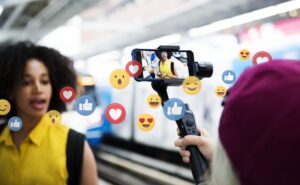
With the rise of social media apps, such as TikTok and Instagram, the dynamics of fame have changed. Celebrities are commonly known as people who attend prestigious events, have accumulated accolades that speak of their talents or are even known for their wealth and status. In today’s climate, the chance for an everyday person to become a celebrity is at an all-time high.
A celebrity is someone who is “a famous or well-known person,” according to dictionary.com. It is easy to conflict the two due to the attention and clout that both celebrities and influencers hold. Social media has changed the celebrity climate and affects who we give attention to, and our current social attitudes contribute to who gets our support.
Influencers can gain fan bases based on support, while celebrities are usually known for their talents. Relatability and likability are key factors in gaining a fan base, which is how most influencers are pushed out into mainstream media, ultimately contributing to their rise in fame.
The Met Gala, for example, has allowed certain influencers to attend, such as Liza Koshy and James Charles, which stirred controversy. Most people look down on influencers due to respectability, but their popularity must be acknowledged.

With the rise of technology and social media, easy access has diminished the allure of fame and what makes someone a celebrity. People were fascinated by those who were famous due to their distant personas, but the access has allowed people to see behind the façade.
The COVID-19 pandemic has also caused people to realize the uselessness of many celebrities and how “out of touch” they can be with the average person, which has changed the reach influencers have gained over social media users.
This shift has allowed influencers to gain endorsement deals and promotions, even collaborating with people who are deemed “celebrities.” Celebrities are taking note of these shifts and have incorporated influencers in promoting their products.
Chelsie Ross, a fourth-year broadcast journalism major, does not think they are replacing celebrities. “Influencer’s fame only goes so far compared to actual a-list celebrities, like actors and singers,” Ross said. “I feel as though celebrities are more known worldwide compared to influencers and celebrities have more name recognition.”
Sandra Nelson, a business owner, thinks influencers are foolish. “Social media influencers do not have the longevity and capacity to last,” Nelson said. “I think if you don’t have any talents or anything of value you are not considered a celebrity.”
The notion of “real celebrities” is still in place, but the path toward becoming a “real celebrity” is not only by singing, acting, or playing a sport. Social media has allowed influencers to branch off and become “real celebrities.”
Whether people accept it or not, times are changing, and the way to fame is changing too.
Joe Gagliese, CEO of Viral Nation, thinks influencers are more impactful than “real celebrities.” “With the world accelerating into digital and social, top influencers already have bigger, more engaged audiences and higher visibility versus many traditional celebrities.”
The shift in the impact of influencers is already set into motion. Social media has changed how we consume content and who we make famous. As social and cultural dynamics change, influencers will soon become the new celebrity and change our perceptions of fame.